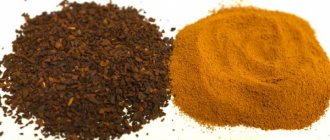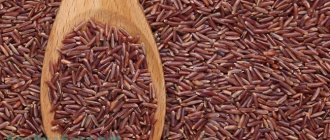Therapy for diabetes mellitus includes not only the regular use of hypoglycemic medications (insulin injections for the first type of disease and tablet drugs for the second type), but also a mandatory diet. Dietary features for diabetics include eliminating foods and drinks from the diet that cause an increase in blood glucose levels.
Drinks such as sweet soda, bottled tea, and packaged juices are absolutely prohibited. They contain large amounts of pure sugar, which is contraindicated for diabetics. As for coffee for diabetes, three-in-one sticks should be completely excluded. Drinking other options for an invigorating drink requires compliance with certain norms and rules.
Useful properties and nutritional value of coffee beans
Natural coffee beans contain many beneficial components. Depending on their processing, the quality of the drink may suffer significantly. Since coffee beans lose some of their valuable properties during the roasting process, green coffee has the most positive effect on health. The instant drink is significantly inferior in composition and taste to ground freshly brewed coffee.
Positive effects on the body of the drink and roasted grains
Caffeine, one of the main components of coffee beans, activates the central nervous system (CNS). As a result, the receptivity of information and the ability to transmit it increases. Memory improves and concentration increases.
The drink stimulates the psycho-emotional state due to the ability of caffeine to enhance the synthesis of adrenaline, dopamine and norepinephrine. Hormones help to increase the duration of the period of wakefulness, accelerate brain activity and psychological reactions, and increase overall tone and mood.
In addition to the psychotropic effect, adrenaline and norepinephrine increase physical endurance and increase the pain threshold. This effect of caffeine explains the increase in physical strength and positive attitude after a cup of coffee.
Coffee beans contain vitamins, minerals and other substances necessary to maintain the health of diabetics:
- vitamin D is the main assistant in the body’s absorption of calcium and phosphorus;
- trigonelline - when heated, molecules of nicotinic acid, or vitamin B3, are released from this alkaloid, which strengthens, supports the functioning of the heart and accelerates blood flow;
- riboflavin (vitamin B2) – helps regulate lipid and protein metabolism, affects hematopoietic processes, supports visual health;
- tocopherol (vitamin E) – increases vascular permeability, accelerates blood circulation, maintains healthy eyes and skin, protects the body from the effects of viruses;
- fiber – when beans are cooked, the amount of fiber decreases slightly, so coffee is a useful product for proper digestion;
- macroelements - magnesium, sodium and potassium are actively involved in maintaining homeostasis (constancy of the internal environment of the body), maintaining water-salt balance, promoting heart function, and ensuring stable innervation;
- chlorogenic acid – slows down the reabsorption of glucose, is a natural antioxidant, has a beneficial effect on cardiac activity, inhibits the activity of free radicals, protects the retina from damage;
- iron – prevents the occurrence of iron deficiency anemia (anemia);
- Theophylline is a methylxanthine that helps relax the muscles of the respiratory system.
Coffee beans contain healthy organic and saturated fatty acids, proteins and their derivatives (amino acids), vegetable fats, and tannins.
Energy value and nutrient ratio
The calorie content of black coffee (excluding any additives) is about ½ kcal per 100 grams. Depending on the type of coffee and processing method, the beans can contain up to 0.2 grams. protein, approximately 0.6 g. fat, about 0.1 g. carbohydrates.
Who should not drink coffee?
The actual course of diabetes mellitus is not the main factor in answering the question of whether a diabetic can drink coffee. This drink is not recommended for older people, since vascular walls react more strongly to adrenaline with age, quickly narrow and are difficult to relax. General contraindications include:
- glaucoma;
- increased excitability, nervousness, irritability;
- arterial hypertension, especially during a crisis;
- diabetic angiopathy (vascular damage), retinopathy (decreased vision), nephropathy (impaired kidney function);
- widespread atherosclerosis, post-infarction cardiosclerosis;
- heart failure;
- rhythm and conduction disturbances in the myocardium.
Possible negative consequences
Excessive consumption of coffee can cause significant harm to health. Considering that most diabetics have a number of concomitant diseases or abnormalities in the functioning of the body, the effects of coffee beans can be negative:
- Load on the heart. The same theophylline that helps free breathing also increases heart rate.
- Increased symptoms of hypertension. With an adrenaline rush provoked by caffeine, blood pressure (BP) levels increase.
- Neuropsychological disorders. Overstimulation of the central nervous system after excessive coffee drinking can cause excessive agitation, irritability, and dysania (sleep disorder).
- Increased blood clotting. Excess caffeine leads to thrombocytosis (increased concentration of platelets in the blood);
- Diuretic effect. The diuretic effect of the drink, if abused, can lead to dehydration (dehydration) of the body.
- Osteoporosis. If you drink unlimited amounts of coffee, it will “wash out” calcium, which leads to the methodical irreversible destruction of bones.
It’s not for nothing that addiction to the drink is called coffee addiction. According to scientific data, caffeine can cause addiction, akin to drugs (addiction). Drinking coffee requires special attention if you have gestational diabetes mellitus.
During the perinatal period, women are advised to minimize the amount of the drink in their diet or eliminate it completely. The negative effects of caffeine can provoke fetoplacental insufficiency, cardiac dysfunction in the expectant mother and child, and nervous overexcitation.
Important! The balance between the positive and negative effects of coffee on the body depends on its dosage. In moderate quantities, grains will not harm the body. Excessive consumption can seriously undermine your health.
Health Recipes
We present to you several options for preparing weak (as befits diabetics) coffee drinks, suitable for different life situations. A healthy approach to cooking grains will not only help nourish the body, but also lift your spirits.
Turkish coffee
To prepare, pour ground grain into a clean pot with a narrow neck, and then fill it with cold water. The proportions are 10 grams of coffee per 200 milliliters of liquid. That is, a tablespoon per standard cup. Next, place the Turk on low heat and cook, shaking slightly occasionally. So, when a foamy head forms on the drink, you are almost there. Did that same cap lift up? Your coffee is ready. Set the Turk aside and let it brew for about two minutes. During this time, the sediment will sink to the bottom, and only liquid will fall into your cup.
Americano
You will need to brew strong espresso in a coffee machine; I use about eight grams of grain per serving. After this, about 150 milliliters of hot water is added to the drink.
Coffee cocktail
Use espresso, cold milk and some ice in one glass. It turns out to be a refreshing summer iced latte.
Brewing green coffee
The brewing scheme is identical to Turkish coffee. A spoonful of ground grain per cup of water. Cook until foam appears.
Absolute contraindications
Can you drink coffee if you have diabetes? Coffee beans do not have a forced effect on blood glucose levels, so the drink cannot be called dangerous from the point of view of the development of hyperglycemia (increased sugar).
Coffee affects the cardiovascular and nervous system, given that diabetes is accompanied by numerous complications; if consumed in excess, the drink can aggravate the manifestations of concomitant diseases.
Stevia for diabetes
You should give up coffee if diabetes provoked parallel development:
- persistent hypertension;
- angiopathy of the lower extremities;
- retinopathy and glaucoma;
- coronary heart disease and tachycardia;
- insomnia;
- stomach ulcer;
- chronic disorders in the functioning of the kidneys and other organs of the urinary system;
- hypercoagulation (increased blood clotting);
- psycho-emotional instability.
It is strictly forbidden to drink the drink in the decompensated stage of the disease.
Contraindications
Despite all the benefits of black and green coffee beans, for certain categories of people consuming them is not the best idea. You should be careful and understand that all products have side effects to one degree or another. The same coffee, when consumed in excess, removes calcium, increases anxiety, and sometimes causes an upset stomach or allergies.
Who should avoid drinking coffee drinks:
- Children under 18 years of age, especially those prone to allergies.
- Elderly people over 60 years of age.
- Patients with high blood pressure.
- Taking sedatives.
Unroasted grains for diabetics
It has been proven that green coffee promotes weight loss, breakdown of lipids and rid blood vessels of excess cholesterol. An important factor for patients with type 2 diabetes is the ability of a coffee drink to increase insulin sensitivity of tissues.
Green grains promote the synthesis of incretins - hormones of the gastrointestinal tract that activate natural insulin and slow down the process of breakdown and release of glucose in the liver. With proper, regular consumption of green coffee, diabetics have a real chance to reduce the dosage of hypoglycemic medications and get rid of extra pounds.
For type 1 diabetics, the benefits of green coffee may not always be beneficial. When artificial medical insulin is administered, additional production of the hormone can provoke a sharp decrease in sugar levels (hypoglycemia). People with the first type of disease are advised to strictly monitor their blood glucose levels when drinking a drink made from unroasted grains.
Green beans also contain caffeine, chlorogenic acid, and a complex of vitamins and minerals. They are enriched with malic, citric and tartaric acid. Contain more protein, nitrogenous substances, fats. The taste of a drink made from unroasted beans, which is typical for coffee lovers, is not in favor of it. If you decide to drink only green coffee, it will take time to get used to its unique taste.
For diabetes, green coffee is a better drink than its black equivalent.
General information
The Middle East is considered the birthplace of coffee. The plant was brought to Europe in the first half of the 16th century. Its aromatic fruits contain more than 1000 organic and inorganic substances.
The composition varies depending on the variety, region of growth, and degree of roasting.
Thanks to caffeine, the drink gives a burst of energy, although there is little of it in the beans (up to 1.5%). Coffee beans are rich in carbohydrates, proteins, organic acids, B vitamins, and phenols.
Composition, calorie content and GI
Black coffee without additives contains few calories: 100 ml of natural ground coffee contains 1-2 kcal.
The granules contain up to 12 kcal due to the presence of stabilizers, flavors and other substances. If you add other ingredients to it, the calorie content will increase. For example, 1 teaspoon of sugar contains about 24 kcal, milk - from 6 to 10 kcal, and cream - up to 45 kcal (depending on the percentage of fat content).
More than 60% of the structure of coffee beans is carbohydrates. Among them, fiber and sucrose predominate, which is 3–7% in Robusta and 9% in Arabica. The grains contain 13–14% protein.
During heat treatment, they bind to carbohydrates. As a result of the reaction, kafeol is released (consists of 250 compounds), thanks to which the drink receives a characteristic aroma. Arabica contains up to 18% fat, Robusta – about 13%.
Coffee contains the following vitamins and minerals:
- pyridoxine (B6);
- thiamine (B1);
- riboflavin (B2);
- tocopherol (E);
- nicotinic acid (PP);
- vitamins D and A;
- magnesium;
- potassium and calcium;
- iron;
- manganese;
- zinc.
The natural product includes many organic acids, tannins, and phenols. Only 15–20% of the beneficial composition remains in instant coffee, the rest are flavors, flavor enhancers, dyes, and preservatives.
Coffee eliminates fatigue due to caffeine, the concentration of which is 1–1.5% (more in Robusta than in Arabica). During heat treatment, its amount increases, which leads to an increase in blood glucose levels.
The glycemic index of natural coffee is 42–53, instant coffee – up to 60 units. The indicator depends on the variety, place of cultivation, and method of preparation. The lowest GI is in ristretto and espresso, the highest in Turkish-made drinks.
Rules for use in diabetes
In order not to harm your health, when drinking coffee you must follow the rules prescribed for diabetics:
- purchase only the grain version of the product;
- drink no more than two cups a day;
- use special coffee filters;
- do not consume after 18:00;
- When brewing, control the strength of the drink (do not get carried away);
- do not add sugar, sugar and vanilla syrup, chocolate during cooking (or separately);
- refuse the drink in a state of stress and anxiety;
- do not drink coffee from automatic coffee machines in questionable establishments;
- monitor blood glucose levels, blood pressure and pulse.
It is not recommended to use cream, a common additive to coffee, especially if the dairy product has a high percentage of fat content. If desired, you can replace the cream with 2.5% milk.
Coffee Recipes for Diabetics
In case of such a chronic disease, it is recommended to drink freshly brewed coffee from natural beans. The most gentle and mild option is beans purified from the active substance caffeine or green coffee - such beans have not been subjected to heat treatment, and drinks based on them have the mildest taste. There are also alternatives to an invigorating drink with a similar taste: chicory, cocoa, Jerusalem artichoke drink.
Jerusalem artichoke coffee
When purchasing fresh Jerusalem artichoke fruits, you need to prepare them before preparing a hot drink.
Ingredients:
- 30 grams of dried Jerusalem artichoke fruits
- A teaspoon of Royal Forest Jerusalem artichoke syrup
- 250 ml water
Cooking steps:
- Grind the required amount of fruit. To do this, cut them with a knife or chop them on a coarse grater.
- Dry the crushed fruits. It is best to do this outdoors or in the sun.
- Fry the dried fruits in a dry frying pan.
- Immediately before preparing a hot drink, grind the dried and roasted fruits in a coffee grinder.
- Place the crushed fruits in a pot and fill with water.
- Cook the drink over low heat until lightly boiling, about 5-7 minutes.
- Add a small amount of Jerusalem artichoke syrup to the finished slightly cooled drink for a sweeter taste.
Cold mochaccino in French
Ingredients:
- 250 ml water
- A teaspoon of ground coffee
- 100 ml skim milk
- 2 tbsp. l. Royal Forest cocoa powder
- crushed ice
Cooking steps:
- Place the ground grains in a Turk and fill with water.
- Simmer the drink over low heat for about 3 minutes.
- Add cocoa powder to the Turk, continue to cook the drink until ready, about 4 minutes.
- Pour the hot drink into a glass, let it cool, add milk and ice.
Useful additions to the drink for diabetes
Spices help increase the benefits of a grain drink and at the same time make its taste more intense. They contain components that improve the condition of the body of patients with diabetes. Spices recommended for diabetics:
- Cinnamon. It is rightfully a diabetic spice. Increases tone and performance, stabilizes blood glucose levels, normalizes digestion, and promotes the elimination of low-density lipoproteins (“bad” cholesterol).
- Nutmeg. Improves memory, increases erectile capabilities in diabetic men, strengthens the heart muscle.
- Ginger. It has a hypoglycemic effect, accelerates blood circulation, activates metabolism, strengthens the walls of large vessels and capillaries, and increases the body's immune strength.
- Carnation. Stimulates brain function, helps remove toxic waste from the body, stabilizes blood pressure, and prevents colds.
- Cardamom. It has a beneficial effect on the gastrointestinal tract (gastrointestinal tract), stabilizes the functions of the central nervous system.
As a tasty and healthy vitamin supplement, coffee complements lemon well.
To add sweetness, the most useful sweetener is stevia. The natural plant product has a zero glycemic index and therefore has no effect on glucose levels. Stevia has low energy value, which prevents you from gaining excess weight.
The beneficial qualities of a sugar substitute include the ability to stabilize metabolic processes, dissolve cholesterol plaques in blood vessels, improve digestion and blood microcirculation processes. Stevia consumption prevents the development of early angiopathic complications of diabetes mellitus.
Synthetic sweeteners are allowed in limited quantities. Of the variety of sweeteners, preference should be given to food additives: sodium cyclamate (E952), aspartame (E951), acesulfame potassium (E950). They do not directly affect blood sugar levels. Sugar substitutes have some contraindications. Before use, it is necessary to obtain the approval of the treating endocrinologist.
Effect of coffee on blood sugar levels
Coffee, due to its chemical composition, has the ability to stimulate the production of insulin, which temporarily reduces blood glucose levels in type 2 diabetes. The drink is rich in caffeine, which has an stimulating effect and stimulates adrenal and dopamine receptors. The composition contains theobromines and theophyllines, as well as tannin and phenolic compounds.
It is known that short-term consumption of natural coffee can increase blood glucose levels, but with systematic use, the opposite effect is observed. In addition, the drink has tonic and general strengthening properties and contains carboxylic acid, which minimizes the risk of stroke and heart attack. It contains more than 30 organic and tannic acids, which have a positive effect on digestive processes. Drinking this drink allows you to:
- dilate blood vessels;
- improve blood microcirculation;
- eliminate drowsiness and give vigor;
- improve mood;
- reduce insulin and blood sugar;
- eliminate the accumulation of fatty deposits;
- increase brain activity;
- remove toxins from the body.
According to some medical sources, if you have diabetes, drinking coffee reduces the risk of developing diabetic angiopathy. Other positive qualities include the pronounced antioxidant properties of caffeine and moderate anti-inflammatory properties.
Despite all the positive qualities, with its systematic and regular use, sleep problems and excessive release of hydrochloric acid may occur, which leads to digestive problems. You should not get carried away with this drink, but if you follow the permissible dose - 1 cup per day, consume high-quality varieties without additional additives, there will be no harm from it.
Results
Diabetes and coffee are quite compatible concepts. With persistent compensation of the disease, the drink can be consumed twice a day. You should choose coffee beans for your daily menu and prepare the drink yourself, taking into account diabetic recommendations, the main ones of which are:
- use of spices;
- drinking not too strong coffee;
- eliminating sugar during cooking (stevia is the best replacement);
- refusal of coffee after 18 hours with unstable glycemia, with elevated blood pressure, in a state of anxiety (nervousness).
Absolute contraindications are decompensation of diabetes, hypertension, tachycardia (and other heart diseases), dysania, vascular complications, and stomach ulcers.
Prohibited and permitted products
The menu should include:
- vegetable and mushroom soups or cooked in low-fat meat broth;
- cereal porridges (buckwheat, barley, pearl barley, oatmeal);
- boiled fish;
- lean meat;
- seafood;
- mushrooms;
- vegetables (cabbage, zucchini, pumpkin, eggplant, cucumbers);
- boiled (preferably in the skin) and baked potatoes;
- legumes;
- greens (lettuce, spinach);
- soft-boiled eggs and omelet;
- fermented milk products (sour cream, cottage cheese, cheese);
- sour fruits (lemons, grapefruits, plums, apples);
- bran and grain bread;
- bakery products made from wholemeal flour;
- some juices, coffee, black, green and herbal tea (rosehip, dandelion, nettle).
You can eat no more than 200 grams of potatoes, and no more than 8-9 tablespoons of porridge and pasta.
The following should be excluded from the diet:
- pork fat;
- fatty fish and meats;
- sausages and smoked meats;
- pates;
- fast foods, semi-finished products;
- ketchup, mayonnaise;
- French fries and potato croquettes;
- salty and spicy foods;
- semolina and rice porridge;
- grapes and raisins;
- flour products (dumplings, dumplings, pies, pancakes);
- baked goods and sweets;
- honey and jam;
- condensed milk;
- chocolate, sweets;
- sweet fruits and berries (bananas, pears, apricots, etc.);
- nuts and dried fruits;
- sweet and alcoholic drinks;
- White bread.
A strict diet must be followed for type 2 diabetes. It is important to consider the calorie content of foods. It should not exceed 1700 kilocalories per day.
With type 1 diabetes, you can eat almost anything, but take into account the permissible number of bread units.
Other beneficial properties of coffee
There are other health benefits of drinking coffee that are not related to diabetes prevention.
New studies that controlled for risk factors have shown other benefits of coffee. These include potential protection against:
- Parkinson's disease;
- liver diseases, including liver cancer;
- gout;
- Alzheimer's disease;
- gallstones.
These new studies also show that coffee reduces the risk of depression and improves the ability to focus and think clearly.











